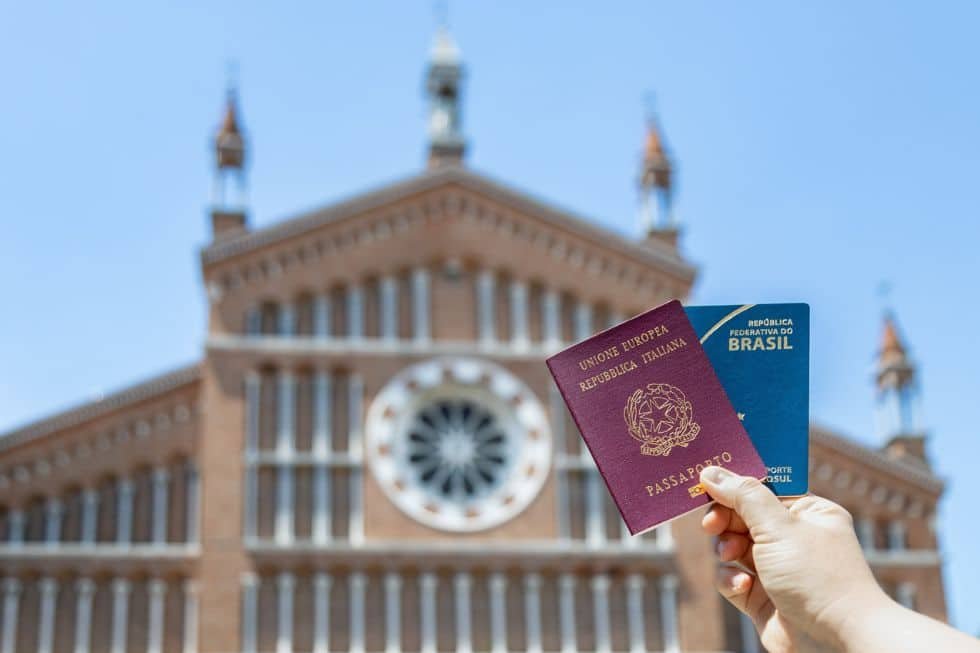On March 28, 2025, Prime Minister Giorgia Meloni introduced restrictions to obtain Italian citizenship by ancestry, affecting millions of Italian descendants. The change sparked legal challenges and concern, particularly in South America, where an estimated 32 million Brazilians and 25 million Argentines lost eligibility by closing the door to citizenship for the world’s two largest Italian descendant communities.
The Trajani Decree — named after the Italian Ministry of Foreign Affairs, Antonio Trajani — introduced the citizenship restrictions, which have now been converted into law (Law 36/2025). The new rules limit the principle of jure sanguinis (“right of blood”) to descendants within two generations (parent or grandparent). In contrast, the previous legislation imposed no generational limits on ancestry for citizenship claims.
These changes mark a sharp break with the broader Italian diaspora that played a formative role in shaping nations and national identities in countries across the Western Hemisphere. Many descendants trace their lineage to great-grandparents or more distant ancestors who emigrated from Italy during the major waves of migration in the late 19th and early 20th centuries.
South America: The land of unlimited opportunities
Although the Italian dream of “L’America” is often linked to the United States for millions of Italians, Argentina, Brazil and other South American countries were the true lands of opportunity.
For the first generation of immigrants, Italy remained a vivid memory, shaping constant comparisons between past and present. Yet, as these communities prospered abroad, life in Italy gradually became a more distant part of their identity.
Today, Italian descendants make up a significant portion of the population in several South American countries. Argentina has the highest percentage, with approximately 62% of its population claiming Italian heritage. Uruguay and Paraguay follow, with 44% and 37%, respectively. Venezuela ranks fourth with 16%, followed by Brazil with 15% and Colombia with 4%.
The connection of these large immigrant communities to Italy evolved with the birth of new generations in South America. Personal memories gave way to a romanticized, inherited imagination that continues to shape the identities of many who wear their Italian heritage with pride. This enduring bond reflects the resilience of a people who, while forging a new future, chose to reimagine rather than abandon their past.
Meloni’s motivations
The Meloni government has defended the new citizenship law as a necessary measure to curb abuses of the system and manage the overwhelming number of applications that have inundated Italian consulates in South America. Officials have argued that many applicants sought an Italian passport for the convenience of European Union access without having substantial cultural or linguistic ties to Italy. Indeed, the number of Italians residing abroad increased 40% from 2014 to 2024, mainly due to the granting of citizenship in Brazil and Argentina. In 2024 alone, Italian authorities granted citizenship to approximately 69,000 Brazilians.
In addition to generational limits, the new law introduces the requirement of an “effective bond” with Italy, meaning that having a distant ancestor alone is no longer sufficient for citizenship. Applications submitted before March 28, 2025, will be evaluated under the previous, more inclusive rules, prompting a surge in filings and creating legal uncertainty for incomplete cases. The government has also centralized application processing, citing efficiency and fraud prevention.
The reaction from Italian communities in Brazil and Argentina has been one of shock and anger. Many families have spent years and significant financial resources gathering the necessary documents to prove their lineage. Community leaders and legal experts have condemned the law as a “betrayal” that severs a vital link between Italy and its global diaspora.
Legal challenges are rising as plaintiffs argue that the new law is unconstitutional and violates the principle of non-retroactivity, asserting that individuals acquire the right to citizenship at birth. The Italian Supreme Court has been reviewing challenges to the law initiated by the lower court in Turin. The legal battles’ full impact remains to be seen.
At a Supreme Court hearing in Rome on June 6, 2025, lawyer Monica Lis Restanio argued that citizenship is a birthright that cannot be arbitrarily revoked. Representing the associations challenging the law (Avvocati Uniti per la Cittadinanza Italiana [AUCI] and Associazione Giuristi Iure Sanguinis [AGIS]), she emphasized that Italian citizenship is a familial bond passed down through generations and only the individual’s voluntary renunciation can sever it, not administrative discretion.
Italian immigration and its lasting influences
Italian immigrants brought with them regional cultural diversity and skills shaped by early 20th-century industrialization. Their human capital enriched the racial and social fabric of South American societies, adding complexity to nations seeking to modernize and forge new national identities.
In the vibrant neighborhoods of Buenos Aires and São Paulo, entire communities pulsed with the energy of Italian immigrants whose presence would leave a lasting mark in these cities. It was in the slang of the streets, the Lunfardo of Buenos Aires and the Cocoliche of its theaters, where Italian words were woven into the very fabric of the local language, creating a new, hybrid vernacular. Far beyond the local influence, Italians shaped the Brazilian Portuguese in such a way that 383 words in the national language are estimated to be of Italian origin.
The cultural impact of Italian immigrants endures to this day in the national life of these countries. In Argentina and Uruguay, the passion for football is a mirror of the Italian tifo.
In Brazil, particularly in the South, the legacy of Italian agricultural colonies is deeply embedded in the landscape. The introduction of winemaking and new culinary traditions has left a lasting imprint, significantly shaping the country’s national cuisine.
Alongside technical skills, Italian immigrants brought a shared sense of entrepreneurial vision that helped drive social change. Influential families like Matarazzo and Crespi played key roles in developing Brazil’s food and textile industries, as the Bardella, Dedini and Romi families meaningfully shaped the country’s equipment and heavy industrial sectors.
Italian immigration played a key role in shaping early 20th-century social and labor movements in South America. Many immigrants arrived already influenced by anarchist and communist ideas, which they shared with local workers. In 1900, Italians made up 80% of São Paulo’s factory and office workforce. Their newspaper Avanti (1902–1908) was Brazil’s first formal socialist leaning publication, highlighting their political impact.
The boundless identities of Italian descendants
The new Italian citizenship law is a significant turning point in Italy’s relationship with its descendants abroad. It is moving from a policy of open ancestral recognition to a more restrictive approach that prioritizes a closer and more recent connection to the Italian nation-state.
At the heart of Meloni’s citizenship approach lies a Manichean and homogenizing vision of “Italianess,” rooted in a narrow idea of social cohesion. This perspective overlooks the rich mosaic of local cultures that have defined Italy since its unification in the late 19th century, in a world shaped by imagined communities and evolving identities.
Thankfully, the Italian Supreme Court appears to support the view that defining “Italian identity” is inherently complex and that politically or ideologically driven concepts should not be the basis for citizenship rights.
[Kaitlyn Diana edited this piece]
The views expressed in this article are the author’s own and do not necessarily reflect Fair Observer’s editorial policy.
Support Fair Observer
We rely on your support for our independence, diversity and quality.
For more than 10 years, Fair Observer has been free, fair and independent. No billionaire owns us, no advertisers control us. We are a reader-supported nonprofit. Unlike many other publications, we keep our content free for readers regardless of where they live or whether they can afford to pay. We have no paywalls and no ads.
In the post-truth era of fake news, echo chambers and filter bubbles, we publish a plurality of perspectives from around the world. Anyone can publish with us, but everyone goes through a rigorous editorial process. So, you get fact-checked, well-reasoned content instead of noise.
We publish 3,000+ voices from 90+ countries. We also conduct education and training programs
on subjects ranging from digital media and journalism to writing and critical thinking. This
doesn’t come cheap. Servers, editors, trainers and web developers cost
money.
Please consider supporting us on a regular basis as a recurring donor or a
sustaining member.
Will you support FO’s journalism?
We rely on your support for our independence, diversity and quality.








Comment